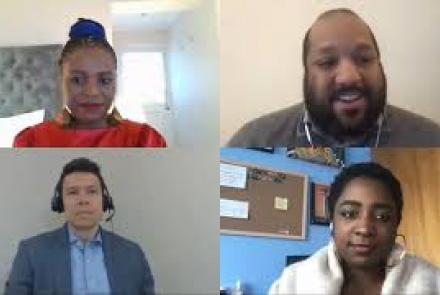This lesson contains both a lecture and a tutorial component. The lecture (0:00-20:03 of YouTube video) discusses both the need for intersectional approaches in healthcare as well as the impact of neglecting intersectionality in patient populations. The lecture is followed by a practical tutorial in both Python and R on how to assess intersectional bias in datasets. Links to relevant code and data are found below.
Difficulty level: Beginner
Duration: 52:26
This lesson provides a hands-on tutorial for generating simulated brain data within the EBRAINS ecosystem.
Difficulty level: Beginner
Duration: 32:58
Speaker: : Jil Meier
Course:
Maximize Your Research With Cloud Workspaces is a talk aimed at researchers who are looking for innovative ways to set up and execute their life science data analyses in a collaborative, extensible, open-source cloud environment. This panel discussion is brought to you by MetaCell and scientists from leading universities who share their experiences of advanced analysis and collaborative learning through the Cloud.
Difficulty level: Beginner
Duration: 55:43
This lesson consists of a panel discussion, wrapping up the INCF Neuroinformatics Assembly 2023 workshop Research Workflows for Collaborative Neuroscience.
Difficulty level: Beginner
Duration: 25:33
Speaker: :
To explore the challenges and the ethical issues raised by advances in do-it-yourself (DIY) neurotechnology, the Emerging Issues Task Force of the International Neuroethics Society organized a virtual panel discussion. The panel discussed neurotechnologies such as transcranial direct current stimulation (tDCS) and electroencephalogram (EEG) headsets and their ability to change the way we understand and alter our brains. Particular attention will be given to the use of neurotechnology by everyday people and the implications this has for regulatory oversight and citizen neuroscience.
Difficulty level: Beginner
Duration: 1:00:59
Panelists shared their unique perspectives on what role neurotechnology and technologists could play in exacerbating or thwarting scientific oppression. Technologies that record and stimulate the brain are set to transform medical treatment, interpersonal life, and even what it means to be human; but these neurotechnologies may, if we’re not careful, continue legacies of harm against people of color, women, LGBTQIA-identifying persons, and disabled people. How can we keep neurotechnology from becoming oppressive? What would 'anti-oppressive' brain technology look like?
Difficulty level: Beginner
Duration: 1:33:16
The INS Emerging Issues Task Force organized a virtual panel discussion on ‘Culturally-Aware Global Neuroethics.’ Panelists explored the issue of cultivating a culturally-aware global neuroethics, and discussed a range of illuminating examples of global priorities in neuroethics.
Difficulty level: Beginner
Duration: 1:03:27
In this interdisciplinary panel discussion, panelists explored and discussed the technical, ethical, and legal dimensions of brain data governance and neurorights.
Difficulty level: Beginner
Duration: 1:00:14
The INS Emerging Issues Task Force held a virtual panel discussion on the evolving role and increased adoption of digital applications to deliver mental health care. It was held as a session at the annual conference of the Italian Society for Neuroethics.
Difficulty level: Beginner
Duration: 58:30
To encapsulate the emerging concerns at the convergence between brain and environmental health whilst aligning it with ethical considerations, the Emerging Issues Task Force of the International Neuroethics Society organized a virtual panel discussion. The panel focused on four areas of analysis. Specific attention was given to how these four tiers come together to provide directions for future ethically-minded and behaviorally-driven environmental health research.
Difficulty level: Beginner
Duration: 1:03:34










